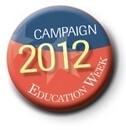The list of speakers at this week’s Democratic National Convention includes the usual lineup of the politically ambitious and the already-famous. It also features a name barely recognized outside the education arena—and perhaps not that well known within it, at least not yet: Montana state schools chief Denise Juneau.
Juneau, who was elected as superintendent of public instruction four years ago, will take the podium at an event that includes scheduled speakers such as former President Bill Clinton, Chicago Mayor Rahm Emanuel, and actress (and Obama campaign co-chair) Eva Longoria.
The convention officially begins Tuesday in Charlotte, N.C., and Juneau’s speaking time still hasn’t been announced. In an interview, she said she was enthusiastic about the opportunity to talk about the school issues and draw a contrast between her party’s positions and those of the GOP.
“People will see a very stark difference between Republicans and Democrats on education,” Juneau said. “I’m really excited to have the opportunity.”
Without going into specifics, the Montana official hinted that her speech could delve into some of the dominant topics affecting schools across the country over the past few years, such as school choice, and collective-bargaining powers for teachers—provisions she regards as important for public officials to protect.
A number of Republican governors, most notably Wisconsin’s Scott Walker, have taken dramatic steps to curb bargaining rights for teachers and other public employees, arguing that state and local labor agreements cost taxpayers too much money and stifle innovation.
Teachers’ unions, which have defended bargaining rights, were on the receiving end of repeated attacks at last week’s Republican convention in Tampa, Fla. Teachers’ labor groups have traditionally been closely aligned with Democrats, and so the Charlotte event will presumably offer the unions a fuller opportunity to make their case.

Juneau also indicated that she will weave personal history into policy arguments. The 45-year-old superintendent is a member of the Mandan and Hidatsa tribes, who is the first American Indian elected to statewide office in Montana, according to her state biography. She received a bachelor’s degree from Montana State University, in Bozeman, and a master’s degree from Harvard’s Graduate School of Education.
While the Montana official has been given a high-profile role at the convention, she’s also argued in favor of having her state act independently of the Obama adminstration on occasion. Over the past year, Montana has been one of a minority of states to reject the administration’s offer for a waiver from provisions of the No Child Left Behind Act.

Juneau concluded that the requirements put on states to secure waivers in areas such as improving teacher evaluation were too costly and onerous, and would be difficult for the state’s rural districts to meet.
That decision, she said, was the right one for Montana. Waivers were merely put forward as “an option for states,” Juneau told Education Week a few days ago. “We’ll continue living by the [the existing law] until Congress acts” to revise the law.
Juneau isn’t the only schools chief from a western state to have have been given a prominent role during convention season. Idaho’s Tom Luna, who championed a far-reaching and divisive agenda that changed how teachers are paid and evaluated and restricted tenure, served on the platform committee at the GOP convention, and was praised by former Florida Gov. Jeb Bush during his nationally televised speech at the event.
Juneau is running for re-election this fall. Her opponent is Republican Sandy Welch, a former teacher and principal who has most recently worked as an education consultant.
Welch, in an interview, argued the state has not done enough to provide parents with readily available information on school performance. She also believes proposed teacher-evaluation standards drafted by Juneau’s office are inflexible and do not take into account local needs.
“Helena is overreaching,” Welch said, referring to Montana’s capital city.
The incumbent described that criticism as off-base. The state has made steady improvements to its online reporting of school performance, Juneau said, and the proposed teacher-evaluation guidelines give local school officials considerable leeway. Juneau said the state had made strides in education during her four years in office.
“Our state has great educational outcomes, and we should be proud of the work our teachers do,” Juneau said. In cases where schools are struggling “we work to support those communities.”
Photo: Montana Democratic Party/AP-File.
